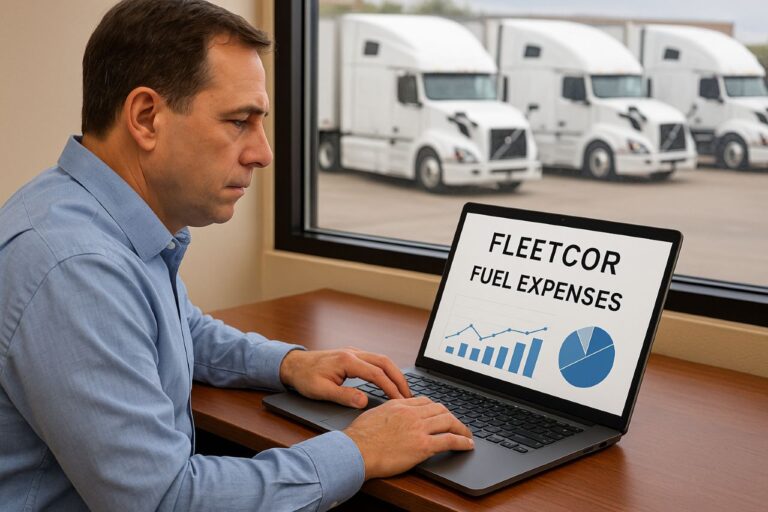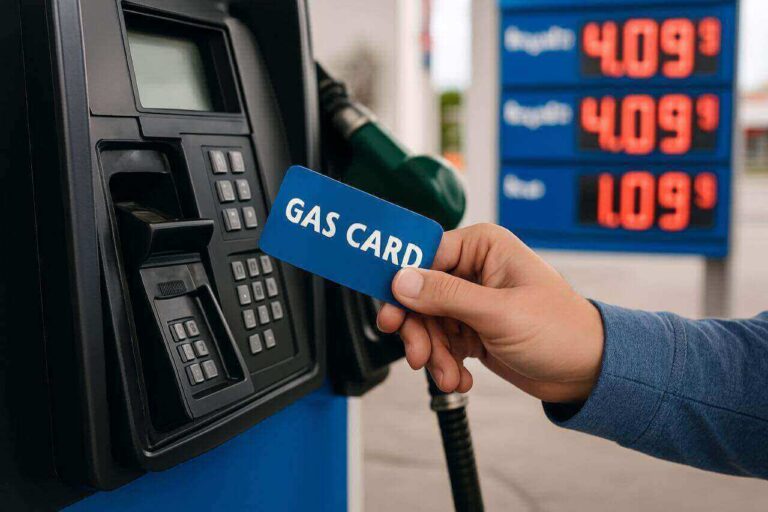Gas Card for Employees: 4 Smart Benefits Your Business Needs
Gas Card for Employees is becoming a game-changer tool for companies looking to manage fuel costs, simplify reporting, and curb fraud. With fuel prices changing daily, companies that operate a fleet—be it big or small—require intelligent solutions to track and control employee fuel consumption. A specific fuel card aids companies in tracking expenses, placing spending limits, and preventing misuses, providing employers with increased transparency and employees with an easy payment option.
Not only is a gas card for employees an expense-controlling tool that many small companies and big corporations are embracing, but more importantly, it simplifies accounting and enhances your bottom line. Whether you operate a logistically based company, a road team of salesmen, or a maintenance crew, fuel cards can make life easier for you. In this article, we’ll walk you through everything you want to know about Gas Card for Employees—from important features to common mistakes—and how to find the right one for your company.
Table of Contents
What is a Gas Card for Employees?

Introducing an Gas Card for Employees has numerous financial and operational advantages. From cost savings to simplified reporting and anti-fraud measures, these cards assist companies in optimizing fuel management without keeping employees out of commission. If you have a small regional fleet or a national delivery business, the correct gas card solution can make a significant difference in your bottom line.
Let us look at the major advantages:
Budgeting and Financial Control:
An Gas Card for Employees represents an organized and easy way to monitor fuel costs. Companies tend to have trouble with indefinite reimbursement slips, variable prices, and unauthorized spending. In a gas card program, every purchase is documented electronically and associated with a given driver or vehicle, providing visibility and real-time visibility.
Benefits:
- Impose spending limits on a daily, weekly, or monthly basis.
- Identify differences in costs between vehicles or teams.
- Automatically record how much fuel each driver or vehicle uses.
Example: Comdata reports that companies using their fleet card program achieve up to 15% reduction in fuel cost in the first six months through policy compliance and fraud protection tools.
Tip: Establish cost-per-mile targets based on monthly gas card reports to recognize route or driver inefficiencies.
Simplified Tax and Accounting:
Another exceptional advantage of the Gas Card for Employees is how it streamlines tax time and accounting. Rather than dealing with dozens of paper receipts, companies receive categorized electronic statements that integrate with bookkeeping software.
How it assists:
- Smoother integration with software such as QuickBooks, Sage, or Xero.
- Detailed itemization of all fuel transactions.
- Distinct separation of business and personal usage.
Example: A small HVAC firm in Arizona using Fleetcor cards embedded directly into their accounting system, reducing their bookkeeping time by 40% every month.
Tip: Export monthly reports and sort by cost center, driver, or vehicle for quicker tax season reconciliation.
Better Fraud Prevention:
Employee misuse and fraud are typical issues, particularly for those companies that have field workers. An employee gas card has several safeguards built-in to prevent loss.
Key fraud prevention features:
- Irregular activity real-time alerts.
- PIN-protected access per employee.
- Odometer readings and purchase records.
Example: An Illinois-based logistics company found that fuel theft was occurring after work hours. After adopting the Shell Fleet Navigator Card, which provides time-based limitations and GPS location tracking, the incidents of theft ceased entirely.
Tip: Periodically review gas card usage reports and cross-check them against shift logs to identify suspicious behavior.
Enhanced Operational Efficiency:
Giving a gas card to employees not only saves your accounting staff time—it also makes your drivers’ and staff’s daily work smoother.
Operational benefits:
- Decreases cash advance or reimbursement needs.
- Improves speed of fueling process with contactless pay.
- Streamlines office-to-driver communication.
Example: Delivery drivers of the ExxonMobil BusinessPro Card credited a 20% decrease in route delays to easier access to fuel and quicker checkout.
Tip: Develop a new driver onboarding guide that outlines responsible use of the gas card, any limitations, and who to call if there are problems with the card.
Smart Benefits Your Business Needs Now

Introducing an employee gas card has numerous financial and operational advantages. From cost savings to simplified reporting and anti-fraud measures, these cards assist companies in optimizing fuel management without keeping employees out of commission. If you have a small regional fleet or a national delivery business, the correct gas card solution can make a significant difference in your bottom line.
Let us look at the major advantages:
1. Budgeting and Financial Control:
An Gas Card for Employees represents an organized and easy way to monitor fuel costs. Companies tend to have trouble with indefinite reimbursement slips, variable prices, and unauthorized spending. In a gas card program, every purchase is documented electronically and associated with a given driver or vehicle, providing visibility and real-time visibility.
Benefits:
- Impose spending limits on a daily, weekly, or monthly basis.
- Identify differences in costs between vehicles or teams.
- Automatically record how much fuel each driver or vehicle uses.
Example: Comdata reports that companies using their fleet card program achieve up to 15% reduction in fuel cost in the first six months through policy compliance and fraud protection tools.
Tip: Establish cost-per-mile targets based on monthly gas card reports to recognize route or driver inefficiencies.
2. Simplified Tax and Accounting:
Another exceptional advantage of the gas card for workers is how it streamlines tax time and accounting. Rather than dealing with dozens of paper receipts, companies receive categorized electronic statements that integrate with bookkeeping software.
How it assists:
- Smoother integration with software such as QuickBooks, Sage, or Xero.
- Detailed itemization of all fuel transactions.
- Distinct separation of business and personal usage.
Example: A small HVAC firm in Arizona using Fleetcor cards embedded directly into their accounting system, reducing their bookkeeping time by 40% every month.
Tip: Export monthly reports and sort by cost center, driver, or vehicle for quicker tax season reconciliation.
3. Better Fraud Prevention:
Employee misuse and fraud are typical issues, particularly for those companies that have field workers. An employee gas card has several safeguards built-in to prevent loss.
Key fraud prevention features:
- Irregular activity real-time alerts.
- PIN-protected access per employee.
- Odometer readings and purchase records.
Example: An Illinois-based logistics company found that fuel theft was occurring after work hours. After adopting the Shell Fleet Navigator Card, which provides time-based limitations and GPS location tracking, the incidents of theft ceased entirely.
Tip: Periodically review gas card usage reports and cross-check them against shift logs to identify suspicious behavior.
4. Enhanced Operational Efficiency:
Giving a gas card to employees not only saves your accounting staff time—it also makes your drivers’ and staff’s daily work smoother.
Operational benefits:
- Decreases cash advance or reimbursement needs.
- Improves speed of fueling process with contactless pay.
- Streamlines office-to-driver communication.
Example: Delivery drivers of the ExxonMobil BusinessPro Card credited a 20% decrease in route delays to easier access to fuel and quicker checkout.
Tip: Develop a new driver onboarding guide that outlines responsible use of the gas card, any limitations, and who to call if there are problems with the card.
Choosing the Right Gas Card for Employees

Not all gas card plans are alike. The selection of the proper gas card for employees is based on various factors, such as fleet size, vehicle type, routes, and how tightly you’d like to control usage. Using the proper provider provides long-term cost savings, lower fraud exposure, and an improved user experience for both employers and employees.
Compare Top Providers:
The market provides a variety of solutions for gas card for employees. Every provider has its own list of benefits, features, and pricing models. Some of the highest-ranked choices are listed below:
- WEX Fleet Card –WEX is one of the most widely used fuel card providers in North America. Their cards are accepted at 95% of U.S. fuel stations, offer customizable limits, and provide extensive reporting tools.
- Key Benefits:
- Real-time alerts and detailed reporting
- Online and mobile app access
- Customizable restrictions by cardholder
- Key Benefits:
- Fuelman Deep Saver Fleet Card
Fuelman provides area-based discounts and robust fraud protection capabilities. It’s best for fleets operating in certain locales and desiring cost savings that are connected to fuel networks.- Key Benefits:
- Up to 10¢/gallon in savings at selected stations.
- Tracking of maintenance purchases.
- Robust fraud protection.
- Key Benefits:
- Shell Fleet Navigator Card
The Shell Fleet Navigator is a versatile gas card that can be used at more than 14,000 Shell stations and other major brands. It’s ideal for mixed fleets and has robust data tools.- Key Benefits:
- Integration with popular accounting systems.
- Driver ID monitoring and spend limits set by the administrator.
- Online portal for simple account management.
- Key Benefits:
- ExxonMobil BusinessPro Card
ExxonMobil’s BusinessPro card provides rewards, data analysis, and alerts for potential fraud—ideal for companies that visit Exxon or Mobil stations often.- Key Benefits:
- Earn rebates per gallon.
- Ability to impose daily transaction limits.
- Fraud notices and card locking functionality.
- Key Benefits:
Think Company Size and Fueling Requirements:
The ideal gas card for employees is a function of your company’s organization and size.
For Small Businesses (1–5 vehicles):
- Prioritize cards with no setup or yearly fees.
- Seek cards that have easy dashboards and reports.
- Pick cards that are accepted by local gas stations.
Example: A Nebraska-based plumbing company owned by a family saved time and made expenses easier with AtoB Gas Card that provides zero hidden fees and contemporary app benefits.
For Mid-Sized Fleets (5–50 vehicles):
- Find volume discounts and real-time notifications.
- Select a supplier that provides maintenance monitoring.
- Provide multi-user access for fleet managers.
Example: An Atlanta-based delivery company selected WEX FlexCard for the feature of allotting cards by route, saving thousands per year in fuel expenses.
For Large Businesses (50+ vehicles):
- Choose business-class fleet management software.
- Support for ERP software and custom APIs.
- Multi-state coverage and tiered user authorization.
Sample: A logistics company with operations in five states chose Fuelman Mastercard Fleet Card for its broad acceptance and compatibility with their SAP system.
Tip: Test an employee gas card with a small cohort of drivers first before launching it across the company. Testing first allows usability problems or policy loopholes to be discovered.
Common Pitfalls and How to Avoid Them

Although the advantages of a gas card for employees are numerous, some companies fall into avoidable pitfalls when implementing a fuel card program. Misinterpretation of fee structures, lack of policy enforcement, or lack of monitoring can promptly turn an expense-saving device into an administrative nightmare. What follows are the most prevalent mistakes—and how to avoid them.
Ignoring Fees and Restrictions:
One of the largest pitfalls in selecting an employee gas card is not reviewing the fee structure. Most vendors publicize low rates or rewards, but that saving can be undercut by concealed fees.
Some typical concealed costs are:
- Inactivity fees.
- Penalties for late payment.
- Statement fees or charges per card.
- Surcharges on out-of-network fuel pumps.
Example: A small HVAC company enrolled in a fleet card with great discounts, but after 3 months discovered that surcharges at non-partner locations were taking away from their savings. It’s crucial to select cards with broad acceptance and clear fees, as per NerdWallet’s Fleet Card Guide.
How to avoid this trap:
- Read the entire terms and conditions prior to signing.
- Request a fee breakdown sheet.
- Compare overall cost of ownership, rather than per-gallon discounting.
Failure to Monitor Usage Actively:
An Gas Card for Employees requires active monitoring to work. Far too often, companies believe fraud or abuse won’t occur, particularly with loyal drivers—but that’s naive.
Dangers of failing to monitor:
- Employees using the cards in personal-use vehicles.
- Overfueling or refueling off-hours.
- Shifting cards to unauthorized individuals.
Example: A Kansas-based logistics business found that they had a night shift driver who was filling up friends’ vehicles with company gas card. Once they shifted to a real-time notification and GPS-enabled card with WEX ClearView, they could catch activity immediately.
Best practices to prevent abuse:
- Turn on transaction notifications and odometer reminders.
- Ask for receipts or regular audits.
- Implement geo-fencing to restrict where fuel is obtained.
Not Training Employees in Usage:
Issuing the gas card to workers without adequate training creates the potential for accidental use or rule violation.
Effects of inadequate training:
- Swiping at unauthorized stations.
- Forgetting PINs or odometer reads.
- Uncertainty regarding limits or types of purchases approved.
Example: A courier service in Denver discovered that drivers were inadvertently using their cards at non-approved pumps and were charged extra fees. Addressing the problem with a short one-hour training resolved the issue and resulted in smoother operations.
Tips:
- Make a brief onboarding tutorial or video.
- Have quarterly refresher training sessions.
- Distribute quick reference cards with dos and don’ts.
Misusing the Wrong Type of Fuel Card:
Not all fuel cards are for all fleets. For instance, a universal card that can be used at most stations could be more effective for mobile sales forces if a branded card (such as Shell or BP) is more appropriate for those firms operating within a given geographic region.
Types of gas cards for employees:
- Universal fleet cards (such as WEX, Fuelman Mastercard).
- Branded cards (such as Shell, ExxonMobil).
- Regional discount cards (such as AtoB or Fuel Express).
An example is a landscaper in rural Utah who originally used a Shell-only card but couldn’t easily locate stations nearby. They changed to a Universal WEX Card and had access to more than 95% of all fueling stations across the country.
Tip: Utilize online station locators offered by card issuers to pilot coverage in your operating locations prior to committing.
Tips to Maximize Your Gas Card Program

Establish Policies:
An effective employee gas card program begins with clear and enforceable policies. Any company should create a formal fuel card use policy that explains acceptable and unacceptable use. Transparency is achieved, and the potential for misuse or fraud is minimized.
Your policy for gas card for employees should:
- Approved Uses: Specify that the card is only for fueling expenses for business travel.
- Disciplinary Actions: Define the penalties for personal use or unauthorized spending.
- Reporting Procedures: Clarify how and when to report lost or stolen cards, including real-time deactivation procedures.
- Example Policy Clause: “Fuel cards may only be used during work hours and within a 10-mile radius of scheduled routes.”
By establishing such rules in the beginning, businesses can avoid confusion and make their employees responsible for every transaction on their gas card for employees.
Utilize Data for Long-Term Planning:
One of the least utilized advantages of a gas card for employees is the level of detailed transaction data it offers. Such data is a goldmine to streamline fleet management and minimize fuel expense.
By analyzing your employee gas card reports on a regular basis, you can:
- Plan Vehicle Maintenance: Look for trends in fuel usage that could indicate engine inefficiencies or past-due service.
- Improve Driver Training: Identify drivers who could be taught more fuel-efficient driving practices.
- Plan Fuel-Efficient Upgrades: Strategically decide on upgrading vehicles or routes for improved efficiency.
Tip: Take a look at and examine gas card for employees reports on a quarterly basis. This will enable your company to continually fine-tune strategies, detect waste, and optimize overall cost management.
Through the integration of solid policies and intelligent data utilization, your gas card for employees program can become an effective money-saving tool and a means of boosting accountability.
Final Thouhgts: Gas Card for Employees

Gas Card for Employees is not just a payment mechanism—it’s a strategic resource for fuel costs control, better control, and overall fleet performance. From fraud protection and simpler tax reporting to happier employees and more, the advantages are apparent.
By selecting the appropriate gas card program, establishing sound policies, and tracking usage regularly, companies can save thousands of dollars per year and headaches. From a small startup with three drivers to a national company with hundreds of vehicles, a fuel card can be a tangible game-changer.
Ready to simplify your fuel management? Learn more today and find the best gas card for employees that will work for your business.
Also read: Axle Gas Card: 5 Shocking Truths Fueling Your Wallet Drain
Frequently Asked Questions (FAQs)
What is the best gas card for employees in a small business?
For small businesses, the best gas card for employees is one with no annual fees, local station coverage, and simple reporting tools. Options like the AtoB Gas Card or WEX FlexCard are ideal due to their ease of use and transparent pricing.
How do Gas Card for Employees help prevent fraud?
Employee gas cards come with security features like PIN protection, GPS tracking, time-of-day restrictions, and real-time alerts for irregular transactions. These controls make it harder for unauthorized use to go undetected.
Can I set spending limits on gas card for employees?
Yes. Most gas card providers allow administrators to set daily, weekly, or monthly spending limits for each employee or vehicle. This ensures control over fuel budgets and prevents overuse.
Are gas card expenses tax-deductible?
Yes. Fuel purchased using a gas card for employees is a business expense and can generally be deducted. Detailed electronic records from these cards simplify expense tracking and tax filing.
What happens if an employee loses their gas card?
Most providers allow instant deactivation of a lost card via online dashboards or mobile apps. Policies should instruct employees to report lost or stolen cards immediately for fraud prevention.
How do I choose between a branded and a universal gas card for employees?
Choose a branded card (e.g., Shell, ExxonMobil) if your fleet fuels at specific stations often. Opt for a universal card (e.g., WEX, Fuelman) if your employees drive in varied locations and need broader station access.
Do gas card for employees work for diesel or only gasoline?
Most gas cards support both gasoline and diesel, as well as DEF (Diesel Exhaust Fluid) and even maintenance purchases, depending on the provider.
Can I integrate Gas Card for Employees data with my accounting software?
Yes. Many gas card programs integrate seamlessly with tools like QuickBooks, Xero, and Sage, helping automate and categorize expenses.







